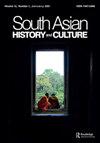Tea as Nature, Tea as Power in Early Modern China: Tea and the Literati in the Ming Dynasty
IF 0.3
0 ASIAN STUDIES
引用次数: 0
Abstract
This paper explores the cultural meaning of tea drinking for the literati in the later part of the Ming dynasty (around 1500-1644), using the pair ideas of tea as representing a lifestyle close to nature, and tea as a powerful representation of tasteful life in the society. The dual meanings of tea reinforce each other for the Ming literati, giving them the means and outlets to bolster their self-expression and to distinguish their identity in the social-cultural context of limited career opportunities. I examine the role of tea in tea books, tea-themed paintings, and Ming literati’s engagement in tea clubs and other related activities. This paper contributes to dialogues at the intersections of nature, culture, and history by treating tea as a nature-culture object, highlighting that the pursuit of nature is itself a form of cultural power.中国近代早期的茶即自然,茶即权力:明代的茶与文人
本文从“茶是一种亲近自然的生活方式”和“茶是一种有品位的社会生活的有力代表”这两种观念出发,探讨明末(1500-1644年左右)文人饮茶的文化意义。茶的双重意义对明代文人来说是相互加强的,给了他们在有限的职业机会的社会文化背景下加强自我表达和区分身份的手段和渠道。我考察了茶在茶书、茶主题绘画以及明代文人参与茶社和其他相关活动中的作用。本文通过将茶作为一种自然-文化的客体,在自然、文化和历史的交叉点上进行对话,强调对自然的追求本身就是一种文化力量。
本文章由计算机程序翻译,如有差异,请以英文原文为准。
求助全文
约1分钟内获得全文
求助全文

 求助内容:
求助内容: 应助结果提醒方式:
应助结果提醒方式:


